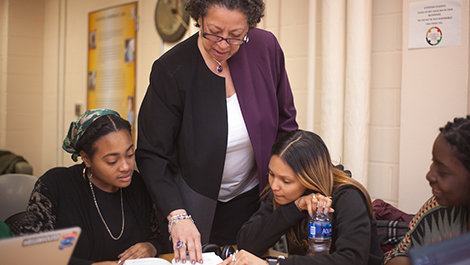
“We embrace diversity of all kinds. I think that in moments of extreme discomfort or unexpected change, good things can result so long as we remember the values that unite people and remain humble and acknowledge we don’t know everything and can learn from everyone.”
With incidents of police brutality and racism happening across the country, Sydné Marrow often sits down and cries.
“It’s heartbreaking,” said Marrow, director of the Center for Multicultural Affairs at Bridgewater State University, reflecting on the deaths of George Floyd, Breonna Taylor and other people of color. “We have made some strides in race relations, but I believe it’s all gone now and we are back at pretty much square one.”
But, Marrow is not giving up. She remains steadfastly committed to her job as students’ trusted ally and to her goal of creating a better tomorrow free from the systems fostering racism.
Marrow and Associate Professor of English Emily Field said the COVID-19 pandemic helped spark protests by accentuating health disparities that communities of color have long faced.
“I think a lot of white Americans have a hard time understanding and believing people of color aren’t treated equally,” said Dr. Field, who coordinates Bridgewater’s African American Studies program. “I very much hope people will come to see that differently and understand they do need to listen to voices of people of color, particularly our black students and colleagues.”
History and context, Field explained, are important to understand racism and the recent protests. Her students often tell her they gained new perspectives about America by studying topics such as the mass incarceration of black people since the Civil War.
“We need to stop being shocked and start paying attention to the forces that make this sort of event happen,” she said.
In the Department of Criminal Justice, Assistant Professor Mike King also helps students understand root causes of the problems and the differences between urban and suburban areas. People must strive to fix economic and other inequalities, Dr. King said.
“I’m very excited and inspired by the courage of people over the past couple weeks, and pretty dismayed by the events that prompted these protests,” he said. “It’s hard for students and people generally … to wrap their head around these events.”
Business executives are also raising their voices and issuing statements denouncing police brutality. They understand staying silent is no longer an option, said Associate Professor of Management Jakari Griffith.
In his diversity classes, Dr. Griffith dispels stereotypes and helps students realize they have more in common than they think. And, for an assignment, he makes students encounter situations as an outsider.
“By creating experiences of isolation or lack of connection, you can build the sense of empathy,” he said.
Members of the BSU community can create change through the classes they teach and attend, the causes they support, and their commitment to fostering diversity.
“We embrace diversity of all kinds,” Griffith said. “I think that in moments of extreme discomfort or unexpected change, good things can result so long as we remember the values that unite people and remain humble and acknowledge we don’t know everything and can learn from everyone.”
Bridgewater State has focused on these issues for 180 years and faculty, librarians and staff continue to help students navigate the various challenges they present.
“They know they can come to me,” said Marrow, the multicultural affairs director. “Even when I can’t do anything, I can listen to them and teach them how to advocate. I’m always available to them.”
Do you have a BSU story you'd like to share? Email stories@bridgew.edu.
